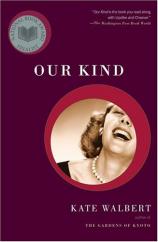Reading Group Guide
Discussion Questions
Our Kind: A Novel in Stories

1. Who is narrating? Discuss the use of the first person plural -- is it effective? How does it alter your view of these friendships?
2. Who are "Our Kind"? What kind of women are they? How does the narration, language and style reflect or enhance the story and the characters? Share an example that you find particularly effective.
3. In "The Intervention," what does it mean when the narrator says, "we've seen a lot, it's true, but know so little. How were we to learn? Years ago we were led down the primrose lane, then abandoned somewhere near the carp pond"? What is the significance of the intervention? At the chapter's end, why does the narrator say, "We must save Him, quick. But first, no. We must save ourselves"?
4. What is your response to Esther, in "Esther's Walter"? Do the women really "love" her? Share your reactions to the group's discussions while at Esther's. How do their actions speak louder than words? Why is Walter's portrait important, and what does it represent? Discuss Esther's "surprise." Compare what happened at the intervention and at Esther's and discuss what these events tell you about the group.
5. Describe Bambi in "Bambi Breaks for Freedom." What does Remington Jackson represent? What does her desire to see him represent?
6. To what does "Screw Martha" refer? What is symbolic about the perception of, and what is to be done to, the geese at the country club? Consider the paragraph near the end of "Screw Martha" that reads, "She tilts the hard hat to show us the egg...dead." How is the information in the passage imparted? Is the narrator reliable here? Why? Why does the narrator wish "Barbara silent a bit longer," to "return...to our green oasis, to the girls in their snowsuits...."?
7. What is the significance of the group gathering at the summer solstice in "Come As You Were"? What does this chapter title mean? After the sentence, "I hid in the armoire and wept, Gay begins", there is a long parenthetical statement: "(What she needs is friends,...lover.)." What is its significance? What affect does this have on your understanding of the story, and the women in it?
8. In "Sick Chicks," focus on the paragraphs beginning, "The group has not entirely assembled..." to "...the butter tong." Consider the way the author describes the women entering the room, and the room itself. What, if any, is the symbolism here? What makes Mrs. Dalloway particularly good for the book discussion group at the hospice? What is Viv's role in the discussion? Why is this scene set at a hospice?
9. Who are the "warriors" in the chapter with that title? Why is Louise considered, "not of our set"? Do you think it's odd that the group admits "we never knew a thing about Louise Cooper, or for that matter, any of our pasts? We look ahead and speak of present things...". Does this fit with what you know of the characters? What, if anything, is significant about Louise's mask, her being photographed like a Madonna and then her water breaking?
10. In "Back When They Were Children," what do the words lost halcyon days represent to these women? Why are the words italicized? Are the mothers very involved in their children's lives? In one another's lives? To what does the chapter's last line refer -- "We've been told the dance will begin"?
11. In "The Hounds, Again," the geese are mentioned again -- "it is only a matter of time before the geese lose their fight." What is really being discussed? To what does the chapter's title refer? Who is the narrator talking about when she says, "it's Him we are remembering, Him we will return to"? Look at the paragraph, "But now He does not look at her,...His slipping tongue." Discuss what is going on and how Walbert captures this all-to-common event in a woman's life, and whether or not she does so successfully.
12. In "The Beginning of the End," Professor Dipple tells Viv: "You might very well read a book from time to time....It will fade into fuzzy thinking." What is she saying? What is Viv's response? What is Viv recognizing here, at this turning point in her life? Why does Viv think, "What possibly else" would she do but get married? What does it mean when the narrator says, "The few times we speak of true things it is almost unbearable"? What "true things" are unbearable?
13. Discuss the book's last line -- why does Viv say this moment is "the beginning of the end"?
14. Looking at the book's structure, do the chapters work well independently? How are they tied together? Could you change their order and still make the book work?
15. What time and place does Our Kind concern itself with? How does Walbert signpost the era (pop culture references, political references, hair styles, etc)? Discuss the cultural and generational limbo they find themselves in. Are these women angry about the course of their lives? If not angry, then what do they feel?
Our Kind: A Novel in Stories
- Publication Date: December 28, 2004
- Genres: Fiction
- Paperback: 208 pages
- Publisher: Scribner
- ISBN-10: 0743245601
- ISBN-13: 9780743245609








